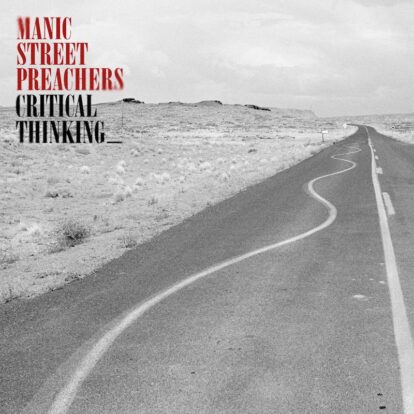
Picture credit: Alex Lake
Having evolved from the sloganeering provocateurs of their early years into spokesmen for reasoned debate, Manic Street Preachers’ new album Critical Thinking sees the trio yearn for nuance. James Dean Bradfield tells us why social media is the cause of his only conspiracy theory – while revisiting his own favourites of pop’s greatest decade.
Going back to his South Wales childhood home in Blackwood recently, James Dean Bradfield helped his father clear out the family’s attic. While doing so, the Manic Street Preachers frontman found the portraits that he had done for his Art O-Level, of Simple Minds, Green Gartside… and Howard Jones.
The makers of Human’s Lib and The Holy Bible might not seem a natural match, but you won’t find a more evangelical enthusiast for 80s pop than James Dean Bradfield. We naturally begin our interview talking about the Manics’ superb new album Critical Thinking but, five minutes in, Bradfield pleads: “This is Classic Pop. Are we going to talk about 80s pop singles? They meant a lot.”
Fair enough. Bradfield says his party piece is being able to list all the singles he bought in the 80s. He begins to recite it at breakneck speed, a collection including Swing Out Sister, The Mighty Wah!, Freeez, Diana Ross, Swans Way, The Blue Nile, Elton John, The Lotus Eaters and “everything off Touch by Eurythmics.” As with so many musicians, the fact Japan were able to be commercially successful is a feat that still mystifies Bradfield and bassist/chief lyricist Nicky Wire, as the frontman laughs: “Nick obsessively watches Japan’s performance of Ghosts on Top Of The Pops in our studio. I’ll come in and go: ‘Are you watching Ghosts again? Fucking hell!’ It’s one of the strangest hit singles of all time.”
Postcard From Moz
Manic Street Preachers just qualify as an 80s band – their debut single Suicide Alley was self-released in 1988. Bradfield, Wire, drummer Sean Moore and sadly departed guitarist Richey Edwards had grown up together as students of the decade’s pop as Bradfield remembers: “Rather than have girlfriends, we’d read The Guinness Book Of British Hit Singles, genuinely fascinated by facts like China Crisis managing two consecutive Top 20 singles.”
They didn’t appreciate its eclecticism at the time, as Bradfield now admits: “We came out of the 80s going: ‘The 80s were shit!’ Politically, of course the decade was atrocious. But the music was unbelievable, and we just didn’t realise that at the time.”
The impact of their formative years is eulogised on Dear Stephen in the new album. Wire’s parents both died in the past five years. Clearing out their house, he found a “Get well soon” postcard he’d forgotten about that Morrissey had sent to the 17-year-old Wire. Wire’s lyrics refer to how the sender’s “history darkens”, but it’s not intended as a rebuke to Morrissey’s politics, as Bradfield explains: “It’s about the vivid memory seeing that postcard made Nick feel, how it sweetly affirmed everything he’d felt as a young Smiths fan.
“I can understand how the song could be seen as an entreaty to Morrissey, but it’s about the emotions those memories bring out. For me, I can sift the past from the present in a very simple way. My memory is of that living room where my dad still lives, watching Hand In Glove on Top Of The Pops. That’s a memory so locked into that time, it’s seared into my retina and inner ear. So, yes, I can divide the memory from perhaps what’s happening now.”
Singled Out
As past students of The Guinness Book Of British Hit Singles, it shouldn’t be surprising that the charts still matter to the Manics. Surprisingly, previous album The Ultra Vivid Lament was only the band’s second No.1, following This Is My Truth Tell Me Yours in 1998. “We still hold on to traditional feats like getting to No.1,”admits Bradfield. “That’s dangerous. Having a No.1 means something – but that means not having a No.1 means something, too. That’s the way it is for us, it’s something you can’t wash out of your system. It still matters if our singles get on the radio, because we grew up with songs by Lloyd Cole And The Commotions, Killing Joke and The Associates getting radio play, which I saw as a victory for our side.”
Bradfield is pleased his band generally know which of their songs should be singles, citing their first No.1 If You Tolerate This Your Children Will Be Next as an exception, thinking it was an interesting album track before their manager informed them: “What the fuck are you on about? This is the single, by a million miles.” Bradfield laughs: “We just didn’t see it at all, but that’s the only time we’ve really missed it. We’ve sometimes got it wrong in what we have chosen. We were completely wrong to pick The Love Of Richard Nixon as a single.”
Rock The Casbah
That singles still mean something to the band makes it significant that Hiding In Plain Sight was Critical Thinking’s second release, as it’s the Manics’ first to feature Wire as lead vocalist. It’s part of the album’s variety with Bradfield, rather than Wire, writing lyrics for Brushstrokes Of Reunion, (Was I) Being Baptisedand Out Of Time Revival. “Everything has been up for grabs in the band for a while,” considers Bradfield. “It goes back to me writing the lyrics for Ocean Spray and Nick doing half the music on Your Love Alone Is Not Enough. We’ve done two solo albums each since then, too, which helps keep the band alive.
“We’re just waiting for Sean to go through his Topper Headon period and write his Rock The Casbah now. Then we’ll really be there. I nag Sean to write more. I’d love him to have that moment where he goes: ‘Right, motherfuckers, this is the hit you’ve been waiting for!’”
Critical Thinking
Bradfield dismisses the idea that his second solo album Even In Exile increased his confidence as a lyricist. Not only did Wire’s brother, the playwright Patrick Jones, pen most of its lyrics, but Bradfield is uncertain how he now judges the album four years on, stating: “I freely admit I don’t know how the album makes me feel. I knew I was proud of it, but it was finished in lockdown, a strange moment in time. I don’t know what I felt, and not knowing what you feel sometimes is fine.”
Indeed, Bradfield wishes that people would admit to being uncertain a lot more often. Critical Thinking is bookended by its title track and One Man Militia, the former vintage Manics sloganeering sung by Wire, whose targets include the hypocrisy of the Be Kind movement, while the latter addresses “The impossibility of reasoned debate in the cesspit of digital oblivion,” as Wire writes in his track-by-track guide to the album.

Picture credit: Alex Lake
Divide & Rule
Bradfield has no social media presence, and no wish for one. “People don’t have enough doubt,” he says. “There are so many 100 per cent-ers, who think their opinion, their values, the way they see the world are 100 per cent correct. They’re not wrong, there’s no room for any doubt. I have no idea how you can be like that. You saw that in lockdown, the Brexit vote, the US election. We’re so polarised. It sometimes feels like a CIA operation, where the best way to ensure everyone is divided is to make sure they rip each other apart – even people on the same side.”
He regrets that “It’s harder to have a broader consensus on the centre-left now,” as he posits: “This is the only conspiracy theory I’ve ever believed in: that we’ve all been taught to fight against each other, rather than to come together.” As Bradfield points out: “We’re the band who named an album after the Nye Bevan quote: ‘This is my truth, tell me yours.’ That’s how he started his debates, and that’s the most shocking thing about the present day, that people who used to be on the same side now can’t coexist with each other. It’s confusing.”
Shock Tactics
This yearning for nuance appears at odds with the band’s early gift for provocation and shock tactics. They’re the band who appeared in IRA-style balaclavas while performing Faster on TOTP in 1994, after all. “We’ve just got older,” reasons Bradfield. “If I was the same person I was when I was 23, I wouldn’t be a very good dad or a very good husband. And I’d be a pain in the arse to be in a band with.”
Bradfield’s personal uncertainties inform Out Of Time Revival, written during a period of struggling to find inspiration. “I was looking for inspiration in all the wrong places,” he says. “Trying to find too much symbolism, looking at everything like it was an opportune moment for a song, whether it was a graveside, a beach or a long drive. I was living life like a bad movie script.”
The answer was, essentially, to just get on with it instead. As Bradfield puts it: “I’m trying to find some of the hard-bitten pragmatism my father’s generation was based on. ‘Get the fuck on with it, son.’ As the old Neil Young quote has it: ‘Find a hole and just dig in, then you’ll find some stuff.’”
Art Therapy
The singer is aware of the irony that one of his other new lyrics, Brushstrokes Of Reunion, is based on seeing meaning in a painting of a flower. But the painting was by his mother, during her cancer treatment before her death in 1999.
“Mum had been going through radiotherapy and chemotherapy for eight or nine years,” remembers Bradfield. “It was a tortuous process. Painting was part of her therapy to calm her down, while her body was being ravaged.
“Painting didn’t seem to help, as she’d get so frustrated that she’d rip the canvases apart like Francis Bacon, destroying her work. I managed to keep that one painting, and it’s got a power over me. It’s very peaceful. If I feel hopeless, or beset by a lack of optimism, I can look at that painting and it will calm me down.”
It’s a touching description, but Bradfield laughs, concerned he’s embodying his mother’s art with too much symbolism, saying: “That painting is the one thing that gives me a black-and-white European cinema moment, of finding meaning in the middle distance. I can find something beyond my imagination that affects me beyond the reality I live in. Out Of Time Revival had to be joyful, simple and forceful. Like the painting, I wanted to make the song uncomplicated.”
If James Dean Bradfield is uncertain about any deeper meaning behind his most recent solo album, the fact it exists, alongside Nicky Wire’s own second solo LP Intimism from 2023, seems to have brought fresh inspiration to their day job.
United Front
Critical Thinking is a thrilling album by anyone’s standards, let alone a band’s 15th record. If the Manics have matured since Generation Terrorists, there are some consistencies. Asked what his band have stood for throughout the 37 years since Suicide Alley, Bradfield ponders: “Trying to find how we fit into the world, not worrying about getting it right, and being engaged enough by the world to write songs about it. That, and we just love being in a band. Staying together is a big thing for us.”
They naturally considered moving on after Richey Edwards disappeared in 1995, as Bradfield recalls: “We were spinning. We didn’t know whether we should change our name, to do what New Order did. But, of course, we didn’t have the same definitive ending as Joy Division had. I don’t think we had the energy to start under a new guise, and it was easier that we had some of Richey’s lyrics to go on Everything Must Go, which still felt part of him. That was important for us to help carry on as Manic Street Preachers.”
The band also considered stopping after the muted response to 2004’s Lifeblood album, as Bradfield now explains: “We’d tried to find another voice, but we didn’t think that voice meant anything. We didn’t know if there was anywhere left to go, so we did a solo album each. Lo and behold there we were.”
Chemistry Lesson
Ultimately, Bradfield’s advice to other bands is simple: take a break occasionally. “Sean will tell you that I can be too pushy and too chatty in the studio,” he laughs.
“If Sean and Nick absolutely can’t be bothered to be around me anymore, they’ll take a month off. Some bands, if they just took a break from each other for two months, they’d realise they still like each other.”
“At the end of [documentary film] Westway To The World, Joe Strummer says of The Clash: ‘Whatever you do, don’t fuck with that chemistry.’ We know we’ve got that chemistry, and we haven’t fucked with it. Ultimately, we speak better as a unit than as one person and always find a way to keep it fresh.”
The grown-up, considered, thoughtful, passionate, funny fucker that is the 55-year-old James Dean Bradfield has to pick his daughter up from school. “Just take some time off,” he advises. “There you go – bands’ couples therapy by James Dean Bradfield.”
Order Critical Thinking here
Sign up to our weekly newsletter
Classic Pop may earn commission from the links on this page, but we only feature products we think you will enjoy.





